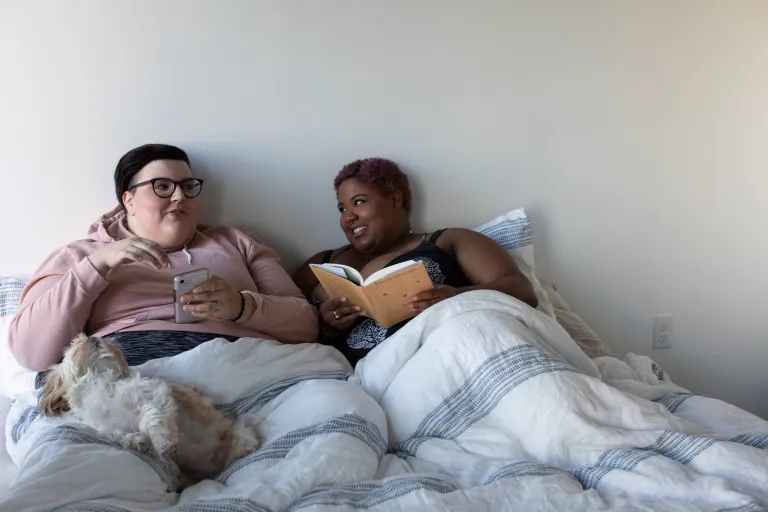
Sleep is undeniably essential, and how you share your sleep space with your partner can play a significant role in the quality of your rest and the health of your relationship. But what happens when you and your loved one struggle to share a bed? You’re not alone, and there’s no need to worry.
Talk about your sleeping arrangements
Sharing a bed can be difficult for numerous reasons – snoring, differing sleep schedules, restlessness, or simply wanting your own personal space. Discuss your sleeping habits and preferences. Remember, some people enjoy sharing a bed and others don’t -- there’s no right or wrong way to be. It’s a careful conversation around practicalities as opposed to an indication of rejection; and that has to be carefully explained. You may not both be in agreement about it initially but a conversation can be opened to consider your options.
Seek out a sleep study
If you do both want to share a bed, then it might be worth trying a sleep study. Sometimes, bed sharing problems are related to undiagnosed sleep disorders like sleep apnea. If one partner’s snorting, gasping, or irregular sleep patterns are interrupting the other’s sleep, it’s worth discussing this with your GP. A sleep study can help identify problems and suggest treatments that can help both partners sleep better – separately or together. Similarly, ‘restless leg syndrome’ needs to be ruled out.
Experiment
There’s no one-size-fits-all approach when it comes to sleep. Don’t be afraid to explore different possibilities. If snoring is an issue, look into anti-snore devices. For couples with mismatched sleep schedules, try separate bedtimes or consider using a white noise machine to block out disturbing sounds. It may be that occasionally you decide to sleep separately, not all the time.
Consider separate beds
Separate beds, or separate rooms, can sound like a drastic step – but it doesn’t need to be. Many couples find they sleep better and their relationship improves when they’re not battling over blankets or losing sleep to a partner’s snoring. It’s essential to ensure your decision is mutual, though, and you will find ways to maintain your physical and emotional intimacy that work for you.
Intimacy
Just because you’re not sharing a bed doesn’t mean you can’t have an intimate relationship. Make an effort to spend quality time together before saying goodnight. Workshop different bedtime rituals you can do together to reinforce that closeness before sleep. Couples often find the idea of being invited into their partners bedroom extremely sexy; it builds up the sexual frisson and excitement. Anticipating sexual pleasure increases dopamine – the chemical our body releases that gives us pleasure.
Embrace the benefits
Not sharing a bed has its advantages. Both of you can enjoy an undisturbed night’s sleep, leading to better mood, productivity, and overall help. The separate spaces can actually spark more of a desire for each other, leading to more quality time spent together during waking hours. A barely there morning grunt of acknowledgement is quite different from a refreshed meeting in the kitchen. Separate beds are not always an indicator of the end of a relationship, but rather that you care enough about yourselves to do what is right for you.
How we can help
If you’re looking for support with your relationships, we can help. We offer a range of ways to speak with a trained relationship expert including ongoing counselling, 30 minute web and phone chats, and one session therapy.
Find out which service is right for you
How you can help
Have you found this advice helpful? Make a donation to help us reach more people and continue supporting the nation’s relationships:
Can't afford to donate? We understand. Instead, we ask that you leave us a 5 star review on Trustpilot.